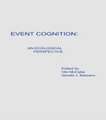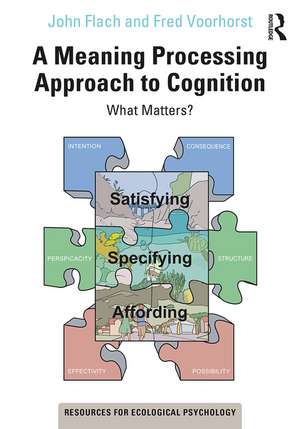A Meaning Processing Approach to Cognition: What Matters?: Resources for Ecological Psychology Series
Autor John Flach, Fred Voorhorsten Limba Engleză Paperback – 12 dec 2019
Featuring a wealth of bespoke illustrations throughout, A Meaning Processing Approach to Cognition bridges the gap between controlled laboratory experiments and real-world experience, by questioning the metaphysical foundations of cognitive science and suggesting alternative directions to provide better insights for design and engineering.
An essential read for all students of Ecological Psychology or Cognitive Systems Design, this book takes the reader on a journey beyond the conventional dichotomy of mind and matter to explore what really matters.
| Toate formatele și edițiile | Preț | Express |
|---|---|---|
| Paperback (1) | 496.81 lei 6-8 săpt. | |
| Taylor & Francis – 12 dec 2019 | 496.81 lei 6-8 săpt. | |
| Hardback (1) | 772.36 lei 6-8 săpt. | |
| Taylor & Francis – 5 dec 2019 | 772.36 lei 6-8 săpt. |
Din seria Resources for Ecological Psychology Series
-
 Preț: 373.49 lei
Preț: 373.49 lei -
 Preț: 293.43 lei
Preț: 293.43 lei - 8%
 Preț: 551.17 lei
Preț: 551.17 lei -
 Preț: 406.22 lei
Preț: 406.22 lei -
 Preț: 339.80 lei
Preț: 339.80 lei -
 Preț: 355.88 lei
Preț: 355.88 lei -
 Preț: 357.65 lei
Preț: 357.65 lei - 15%
 Preț: 470.05 lei
Preț: 470.05 lei -
 Preț: 357.17 lei
Preț: 357.17 lei -
 Preț: 340.86 lei
Preț: 340.86 lei - 15%
 Preț: 507.92 lei
Preț: 507.92 lei -
 Preț: 355.58 lei
Preț: 355.58 lei - 5%
 Preț: 1168.92 lei
Preț: 1168.92 lei - 15%
 Preț: 677.30 lei
Preț: 677.30 lei - 15%
 Preț: 448.78 lei
Preț: 448.78 lei -
 Preț: 449.41 lei
Preț: 449.41 lei -
 Preț: 449.41 lei
Preț: 449.41 lei
Preț: 496.81 lei
Nou
Puncte Express: 745
Preț estimativ în valută:
95.09€ • 103.33$ • 79.93£
95.09€ • 103.33$ • 79.93£
Carte tipărită la comandă
Livrare economică 21 aprilie-05 mai
Preluare comenzi: 021 569.72.76
Specificații
ISBN-13: 9780367404291
ISBN-10: 036740429X
Pagini: 352
Ilustrații: 3 Tables, color; 226 Halftones, color; 229 Illustrations, color
Dimensiuni: 178 x 254 x 17 mm
Greutate: 1.57 kg
Ediția:1
Editura: Taylor & Francis
Colecția Routledge
Seria Resources for Ecological Psychology Series
Locul publicării:Oxford, United Kingdom
ISBN-10: 036740429X
Pagini: 352
Ilustrații: 3 Tables, color; 226 Halftones, color; 229 Illustrations, color
Dimensiuni: 178 x 254 x 17 mm
Greutate: 1.57 kg
Ediția:1
Editura: Taylor & Francis
Colecția Routledge
Seria Resources for Ecological Psychology Series
Locul publicării:Oxford, United Kingdom
Public țintă
PostgraduateCuprins
Preface
Acknowledgements
Praise for this book
PART 1
The Metaphysics of Meaning
1 The Reality of Experience
2 Putting Things Into Perspective
3 Can’t You Read the Signs?
4 What Matters?
PART 2
The Dynamics of Circles
5 Abduction
6 Thinking in Circles
7 Controlling
8 Observing
PART 3
The Pragmatics of Problem Solving
9 Muddling Through
10 Heuristics: Biases or Smart Instruments?
11 Deep Structure?
12 The Heart of the Matter?
PART 4
Broadening the Perspective
13 Dynamics Matter
14 Social Dynamics
15 Putting Experience to Work
16 Closing the Circle
Index
Contents
x
Acknowledgements
Praise for this book
PART 1
The Metaphysics of Meaning
1 The Reality of Experience
2 Putting Things Into Perspective
3 Can’t You Read the Signs?
4 What Matters?
PART 2
The Dynamics of Circles
5 Abduction
6 Thinking in Circles
7 Controlling
8 Observing
PART 3
The Pragmatics of Problem Solving
9 Muddling Through
10 Heuristics: Biases or Smart Instruments?
11 Deep Structure?
12 The Heart of the Matter?
PART 4
Broadening the Perspective
13 Dynamics Matter
14 Social Dynamics
15 Putting Experience to Work
16 Closing the Circle
Index
Contents
x
Notă biografică
Fred Voorhorst received his Ph.D. in Industrial Design Engineering from The Delft University of Technology in 1998. He then took up a position as researcher at the ETH Zürich, before moving to industry where he worked in various sectors such as software, automotive, fashion, and financial, always linking product design, product development, and business development, and preferably exploring the boundaries of the impossible. Whenever possible he would grasp the opportunity to teach on product design in the tradition of ecological perception.
John Flach received his Ph.D. in Human Experimental Psychology from The Ohio State University in 1984. After more than 30 years teaching and supervising graduate research in universities, he recently joined Mile Two LLC as a Senior Cognitive Systems Engineer. John has written extensively about Cognitive Systems Engineering (CSE) and ecological approaches to human performance and design (including three co-authored books, three co-edited books, and more than 180 archival publications). After many years of talking and writing about CSE and Ecological Interface Design, he welcomes the opportunity to test what he has learned against the challenge of designing practical solutions to contemporary business problems. To learn more about John, check out his Perspicacity blog: https://blogs.wright.edu/learn/johnflach/author/w001jmf/ or his extended bio : http://psych-scholar.wright.edu/flach
John Flach received his Ph.D. in Human Experimental Psychology from The Ohio State University in 1984. After more than 30 years teaching and supervising graduate research in universities, he recently joined Mile Two LLC as a Senior Cognitive Systems Engineer. John has written extensively about Cognitive Systems Engineering (CSE) and ecological approaches to human performance and design (including three co-authored books, three co-edited books, and more than 180 archival publications). After many years of talking and writing about CSE and Ecological Interface Design, he welcomes the opportunity to test what he has learned against the challenge of designing practical solutions to contemporary business problems. To learn more about John, check out his Perspicacity blog: https://blogs.wright.edu/learn/johnflach/author/w001jmf/ or his extended bio : http://psych-scholar.wright.edu/flach
Descriere
This book questions the metaphysical foundations of cognitive science and suggesting alternative directions to provide better insights for design, taking the reader on a journey beyond the conventional dichotomy of mind and matter to explore a world of ‘what matters’.
